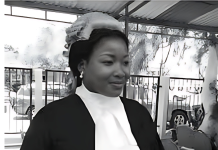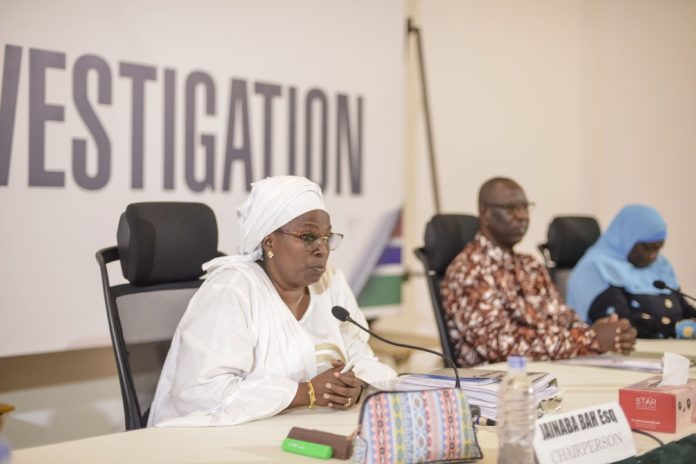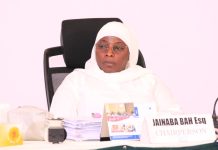By Yankuba Jallow
Malamin I.L. Bojang, the former chairman of the Kerewan Area Council, returned to the witness stand on Wednesday, July 23, 2025, before the Local Government Commission of Inquiry, where he faced scrutiny over a series of damning audit findings that exposed deep-rooted financial mismanagement and administrative lapses at his council during his tenure. The hearing, conducted at the Djembe Hotel in Kololi, forms part of a wide-ranging inquiry into the financial and administrative activities of all local councils between May 2018 and January 2023.
Lead Counsel Patrick Gomez led the questioning, pressing Mr. Bojang to explain why successive audit reports uncovered systemic failures and repeated violations of financial procedures. “The 2018–2019 National Audit Report showed that an amount of D807,335 was paid without supporting documents,” Gomez pointed out. “It means the CEO and the Finance Director authorized payments without following due process. That is almost a million dalasis lost to poor accounting. Was this addressed?”
Mr. Bojang acknowledged the failures but was quick to label them as “technical problems” and shifted the blame toward the council’s accounting personnel – the CEO and finance director. “A man like me, who is not even in accounting, if I can detect there is no supporting document, how do you expect the auditor to justify such payments?” he asked. “These are some of the mistakes they make, and they are realized as fraud.”
The witness defended his personal conduct and stressed that he had raised these issues during council meetings but conceded that no decisive action had been taken. “We would talk about it in meetings, but nothing was done,” he said, adding, “Maybe because of the level of knowledge in accounting.”
Mr. Gomez did not let the explanation pass unchallenged. “So we have substandard people managing offices. That’s the reality,” he said bluntly. “Do you not think that people who occupy sensitive positions in the council should be educated to a certain level?”
Mr. Bojang admitted that many staff rose through the ranks from junior positions such as tax collectors to senior finance roles without the requisite qualifications. “That is also one of the problems,” he said. “They are promoted without merit.”
He then offered what he considered a structural solution: better compensation and professionalization of local governance. “Councilors are not paid salaries—they only receive allowances,” he explained. “They should be paid. When I joined the council, I was paid D5,000. Today, councilors are paid D6,000, and chairpersons earn a basic salary of only D10,000. That is not enough for the kind of work they are expected to do.”
According to Bojang, this meager compensation discourages qualified individuals from contesting council elections and leaves councils in the hands of untrained officials. “If councilors are paid proper salaries, capable people will apply for these positions,” he argued. “It will be competitive.”
Gomez seized the opportunity to draw a link between low salaries and potential corruption, citing several examples of councilors mismanaging project funds. “Many councilors came here before this commission with nothing but loose papers to show for projects they claimed to have implemented. They cannot explain what they did with the money allocated to them,” he said. “It’s embarrassing.”
He added, “The issue is not just lack of education, but also the unwillingness to abide by regulations. Everyone knows the laws exist—the Local Government Act, the Financial Manual—but nobody follows them.”
Mr. Bojang agreed. “I admit that. Sometimes you are ashamed when the auditors reveal certain findings,” he said. “I would sit there during debriefings and feel embarrassed, thinking that if I had control, I could have done better.”
Gomez then turned to broader structural issues, questioning the effectiveness of the Local Government Service Commission, the body responsible for appointments and discipline in local councils. Mr. Bojang said the centralized nature of the commission rendered it ineffective and suggested that the commission should be decentralized. “We should have a regional Local Government Service Commission that is close to the councils and can see their day-to-day operations,” he proposed.
However, both Gomez and Bojang acknowledged the risks of proximity-based corruption. “If they are close to the councils, they can easily be compromised,” Bojang conceded. “That is the downside.”
The conversation then pivoted to the 2020 and 2021 audit reports, which revealed continued deterioration of financial management despite previous warnings. The 2021 report flagged an understatement of bank balances by D863,568.84 and unrecorded direct transfers totaling D4,059,491. In addition, it listed multiple instances of payments without vouchers, overstatement of revenue in cashbooks, and unposted collections by revenue collectors amounting to D318,734.
Mr. Bojang appeared startled by the figures and admitted their seriousness. “That is a huge amount of money,” he said. “It could have built a market or school. It is wasted.”
Chairperson of the Commission, Madam Jainaba Bah Sambou, also joined the questioning. “Did the council take any action to investigate these findings?” she asked. “Did the CEO or Finance Director provide any explanation for the missing amounts?”
“No,” Bojang replied. “It is really humiliating. These people know they are handling public funds. Such understatements are unacceptable.”
Mr. Gomez emphasized that these audit findings were consistent across all area councils. “The auditors always issue an adverse opinion, which means the financial statements are so poorly kept they cannot even form a proper opinion,” he said. “No area council in this country can put their hand on their chest and say they have served the people properly. They could have done way better.”
Bojang, while accepting many of the criticisms, argued that the situation is gradually improving. “Yes, there is progress,” he said, “but I agree it is insignificant compared to the problems we are facing.”
He recommended mandatory training for accounting and administrative staff. “The auditors should help train our finance officers, our CEOs, and directors,” he said. “That will help address the issues.”
Gomez agreed, but noted that training alone would not address corruption. “Training will improve efficiency, but it won’t stop people from stealing. Corruption is about character, not competence,” he said. Bojang agreed. “This commission will not stop all corruption, but we hope it will minimize it.”
Mr. Bojang concurred. “People have learned a lot from this process,” he said. “People are more educated now. They have seen the consequences of mismanagement and corruption. Things will improve.”
As Chairperson Jainaba Bah noted, “The goal of this commission is not just to find faults, but to build a better system. One that serves the people with integrity and efficiency.”
The Local Government Commission of Inquiry is expected to continue hearing testimonies from officials across the country as it builds a comprehensive picture of local governance failures and crafts recommendations for reform.






















